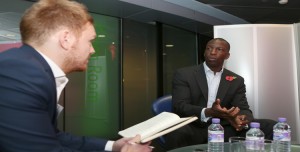After hanging up his gold spikes in 2000 Michael Johnson founded a training business geared towards helping athletes of all abilities reach their full potential. He’s also built a stellar reputation as a TV pundit. In part one of our exclusive interview he talks business and the BBC with Matt Ketchell
Your training service business, Michael Johnson Performance, helps athletes of all abilities realise their full potential. Was that a venture you always intended pursuing when you hung up your racing spikes?
I can’t say it was something I always intended to go into, but I saw a need for the type of training and services we provide based on my own career. When I was competing I was fortunate to have a team of individuals around me who allowed me not only to stay healthy, but improve my performance and achieve consistency throughout my professional career. This [Michael Johnson Performance] is somewhat unique. I thought if we could package it and make it available to athletes of all different sports and abilities it would be something unique. That’s how the idea came about.
What skills and experience did you learn on the track that transferred over into the business world?
It’s very interesting having been an individual athlete in an individual sport and now being part of a team and leading that team. But the way I attacked goals and accomplished them as an athlete is something I’ve certainly brought over to this business. The issue is getting other people on board, making sure, from a leadership standpoint, that you’re able to motivate each individual employee. Their personal goals have to fit with the overall team goals, that becomes a little bit complex and it’s taken me sometime to navigate, but through trial and error we’re getting there.
You studied business at university, have you always been business minded?
Yeah, I would say so. I’ve always been interested and intrigued by business. I studied business at university then went immediately into my athletic career. I’ve spoken about athletes taking personal responsibility for their careers; it’s something that was just inherent with me. I always approached my athletic career as a business, I hired my coaches and support team, I held them to standards I expected. We developed a plan to get where we wanted to be and I took a very business-like approach to it, so the transition for me from my athletic career into the businesses I’m involved with now wasn’t as dramatic as it may have been for some athletes.
As well as your athletic career you’re renowned for your work as a BBC pundit. How come UK viewers get the benefit of your insight rather than the American networks?
Quite frankly US networks don’t dedicate as much time to athletics as the UK does. I’m able to work in television here but not be a full-time television pundit. In the US the model is quite different. You must be a full-time television pundit in order to do anything. I love television, but I love being able to pick and choose projects. I wouldn’t be able to do that in the States.
You seem very knowledgeable about events other than your own, particularly distance events. How do you draw on your own experience to make intelligent comments about events like the 1500m and 10,000m?
I try to do as much research as I can to know the athletes and understand who I’m talking about, but a lot my role is focusing on the strategy an athlete might employ in a race, or in any sport. The same principals apply, it’s just a matter of understanding the sport and athletes. My job is to educate the viewer in terms of what they’re seeing.
In America is there a danger of talented sprinters and long distance runners choosing sports like American football over athletics because it’s more popular?
You lose some athletes from track and field to sports like American football because it’s a much more lucrative sport. You’ve got 68 athletes on a roster and 32 teams in the league, it’s a much different situation. We’re flooded with sports in the US – team sports dominate. Here in the UK you have Premier League soccer, you’ve got rugby and that’s about it for team sports at the highest level. In America there’s football, and baseball, and basketball, and ice hockey, and soccer – all of those are team sports. Every city has at least one team, some will have two or three. It’s hard to cut through that because the team is affiliated with the city, so every citizen of that city is going to follow that team. In the traditional model of print media the first 10 pages of the paper are going to be filled with the local team’s news. People don’t go out and sprint 100m for fun, but they do play tennis for fun, they do play golf for fun, so they identify with those sports, so that’s page 11 and 12. Athletics is on the pages that don’t even get printed. That’s the model. People always say all the time, “How are you going to change that?” You’re not going to change that. Track and field is never going to be, in the US, on a level of a team sport or recreational sport like tennis or golf. It’s not going to happen.
Watching as much British athletics as you do, are there any young runners that excite you at the minute?
I hesitate to pick out one athlete or two athletes and highlight them. It can be extremely difficult for young athletes to reach their full potential when there’s so much pressure at a very early age. I’m part of the British media now, and what we tend to do is say “This is going to happen, this athlete is going to do this,” that’s not necessarily so. From my standpoint potential is only potential. Potential doesn’t really excite me. I like to see athletes who are going to be competitors and are going to be competing for championships, you only know when that’s going to happen when you seen an athlete reach their potential. They’re looking for those marginal gains to take themselves from being a finalist to a gold medallist. That’s what excites me.
Michael Johnson was speaking at the Nolan Partners Sport Industry Breakfast Club. Michael also provides world-class training advice through Michael Johnson Performance (michaeljohnsonperformance.com)







